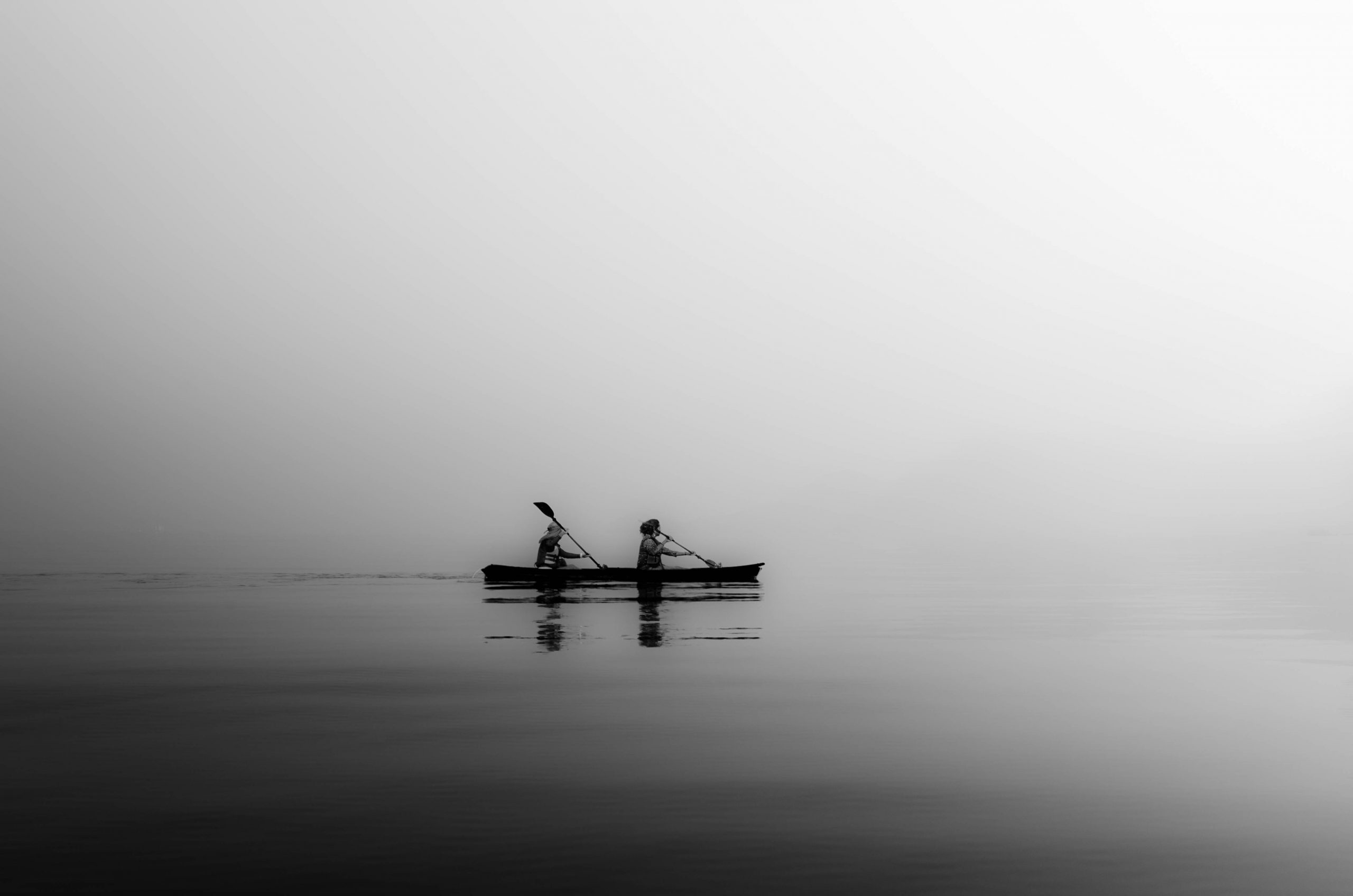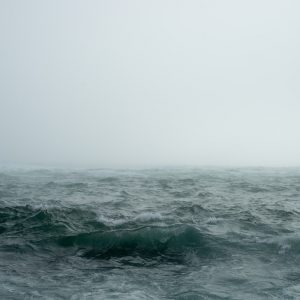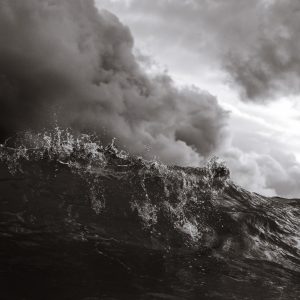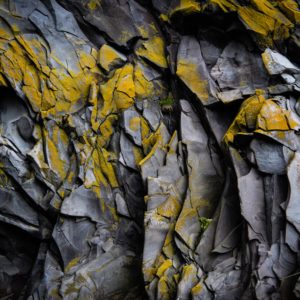“The Mystery of the Shattered Goblet,” our mother says when we break a wineglass, doing the dishes.
“Secret of the Missing Algebra Textbook,” she says when we tell her why we can’t finish our homework.
She is worried, always, that we will forget who she was—as if we could. Bookshelves lined with her escapades, her hometown paper printing an annual retread of her greatest cases. “Listen to this one,” she says when the year’s edition is mailed out. The paper always shoved, as if dismissed, behind a sofa cushion or near the recycling bin. “She was a titian-haired beauty,” she reads, not long before she begins her greatest case yet. Not bothering with the rest of the story, eyes trailing us as we read Jane Eyre for Honors English. “Remind your father,” she says, “the next time he comes home. A titian-haired beauty.”
#
This is the year the whole north of the state is on fire. Flames licking across the television, clots of smoke transformed into mists and clouds that roil town. “A good time to be in insurance,” our father says, “or the worst time”—claiming no alternative to his long hours at the office. There is a day, though, that we can remember, a day when our house goes from debates and tired mystery stories to silence and separation. A thing has happened, which we are not allowed to know.
The only time we see him is after school, visiting his office. He trains us in filing tilting stacks of paper, while we all pretend to ignore the deflated air mattress folded behind his desk. Same as our mother, he says he doesn’t want to talk about the only thing he wants to talk about. “Come for dinner this weekend,” we tell him, and “Come to our play.” Depositing tickets and handwritten menus on his desk, trying to lure him back. “I love you,” he tells us, “I want to come home, but your mother—there’s no reasoning—she’s too set in her ways—she’s too—”
Our mother, though, has never struck us as being too much of anything. She is one of those figures you read about in novels, wraith-like women who dress each day in their decomposing wedding gowns; only instead of old dresses she is cloaking herself in the mysteries she used to solve. “Your father,” she tells us, “was my greatest assistant.” Leaving us to seek the truth of her rescues from chloroformed rags, haunted attics, lakeside cabins; how our father was always two steps behind Beth and Sam and our mother. With him gone she spends hours on the phone each day, talking to these friends we’ve only read about. She becomes one of those women who forget to eat, elbows sharpening as she winds the cord around her finger.
Then one day she picks us up from school, unexpected, in a cherry red Miata. “You can tell your father it didn’t break the bank,” she says as we climb on each other’s laps in the passenger seat. A trip to see Sam, she announces. A chance to escape the smoke-polluted fog, a breather from our father. Her hair, for years a lifeless absence of color, glints strawberry blonde as she puts the car in gear. “Big Sky Country,” she says, and “Land of Shining Mountains.” Our legs cramp and we switch positions, hitting our heads on the roof, every hour. Bookbags stifling our legs and phones out of reach, no way to call our father and beg a stop to whatever adventure she’s imagined. Whispering to each other the things we are missing: the musical’s final show, band practice, AP exams. Backyard gossip, a weekend in Loch Lomond, crouching in the woods where the cross-country team comes streaming around a blind curve. More things that, thanks to our mother, we will lose and never manage to recover.
We spend a full day this way, stopping only for restrooms and paper cartons of chicken fingers and fries from A&Ws. That first night, before we know how far gone she is, we stretch on the side of the road while our mother watches the sun set. “There would have been a day,” she tells us, “when Ted would have been game for this. When he wouldn’t just sit in his office pushing pencils.” Her tone, like she didn’t used to complain about the skeletal remains of cars he scattered through our backyard. “She thought I was a car thief!” he would exclaim every time he told the story of their meeting, as if this were a joke rather than a harbinger of things to come.
The second night, we reach Sam’s house just before dark. Stretching our necks and our shoulders and our legs next to the car, feeling like we may never stand our full height again, while our mother runs down the drive to a woman with brown hair curling above her ears. “The spitting image,” we hear her say before our mother waves us over, brings us in to meet this woman she says is her greatest friend.
#
We’re shuttled to a guest bedroom beneath the eaves, where we walk with necks bent to avoid the ceiling. Lying on our stomachs by the heating vent, our mother and Sam in the kitchen speak so clearly they might have been in our room. The chattering of dishes and forks in the sink, water splashing.
“—stupid mistake,” our mother says, “I never should have told him—”
“Bets, don’t blame yourself for trusting—”
“—but we kept these bracelets on the girls, when they were younger—you’ve never seen two girls who looked more alike—they recommended it, at the hospital—but I don’t know what happened, I was giving them a bath and took them off, I wasn’t thinking—”
“I don’t see what you did wrong,” Sam says, “anyone might have, and you told him…how he could be mad at you—years ago—”
“But I didn’t tell him,” our mother says, and we look at each other as she talks through the vent. Those eyes, that nose, those lips. We are like looking in a mirror, we are so still. “Not until last year, I just couldn’t carry it any longer—you always think you’re going to figure it out, but I kept switching those bracelets and I don’t know, Sam, they could be anyone.”
We stop listening. We sit on a bed, heads bumping, we hold hands. “But,” I say, “I’m Lettie. And you’re Tansy.”
“Or,” you say, “I’m Lettie.”
We have the same half moons at the base of each fingernail. We have the same hangnail that always forms, again and again, on the outside of our right thumb. We have a freckle exactly on the knuckle of our ring finger. It is not so impossible to imagine our mother, who each birthday switches our portrait positions, mixing us up.
“Do you think,” you say, “those portraits are for evidence.”
Yes, I think, and wait for you to understand my mind, the way you always do.
“This is a case,” you say. “The mystery of the mixed-up daughters.”
“The clue of the turned-about twins.”
In fourth grade, we switched seats and waited for Mrs. Ademovska, our friends, anyone, to notice the difference. Last year, we went with our different boyfriends only to see, only because we are curious. The world sees us as one person split across two bodies; why shouldn’t our mother? Only it has never struck us as a problem to solve.
“It’s why he’s so mad,” you say, and when we lie down, when we gesture at sleep, we try to trace back our lives to the moment when our father realized he didn’t know us. Trying to locate a night that must have seemed unremarkable at the time, when he packed his bag for an overnight conference, or stayed late at the office, or phoned to say there was an insurance emergency. “Is there such a thing, as an insurance emergency?” I whisper, and you take my hand, squeeze it until I feel my bones shift. I would have you squeeze tighter, though. I would have you squeeze until the line between us is erased, and then forgotten.
#
What she has, Sam says, is a “hobby farm.” A term we have never before associated with a person. Her wife appearing in the morning, a woman with platinum hair pinned behind her ears, faded jeans, rolled shirtsleeves.
“Three horses,” Sam says, “and a dozen sheep—”
“Eleven,” her wife corrects.
“—and chickens, of course, we’ll do a scramble for breakfast.”
“And the goat,” her wife says, “and the cats. Two dogs.”
We sit at the table, us and our mother, and watch them move before the stove. There is a choreography, the way Sam hands her wife a pan or a dishtowel, the way she lifts plates from the stack as her wife deposits a spatula of eggs on each in turn.
“How long are we staying?” you ask our mother, who shakes her head and tucks her hair behind her ears. “Titian?” you mouth to me.
“How delicious,” our mother says when Sam brings the plates, and we are reluctant to agree. The salty burst of potatoes and peppers, the paprika-tinted eggs.
“Can we call our father?” I ask after our mother butters her toast, as she licks the smears of yellow on her fingers. “Can we call the school?”
“I’ve taken care of everything,” she says. “You two are just to enjoy yourselves while Sam and I handle some adult business.”
Adult business, she says, like we are not near adults ourselves. When Sam’s wife asks us to help with the dishes after breakfast we refuse, plying the part of sullen teenagers so we can clamber into a tree and listen to our mother and Sam. Bark etching tattoos on our stomachs, indentations that will take hours or possibly lifetimes to fade.
“If we could get Beth out here,” our mother says, “that would be the best—to have the whole gang back together.”
“It wouldn’t quite be the whole gang,” Sam says, “and you know, she’s pretty deep into real estate now. Out in Connecticut.” The way she says this, we understand “Connecticut” is a place with connotations.
“Then,” says our mother, “I wonder if you saved the drawings the girls sent, every year. Maybe there’s a clue there. An artistic tic.”
“But if you changed them multiple times—”
“If you have the pictures. I’ve looked at mine, of course, but maybe—there could be something.”
We stay in the tree after they go. “What if,” you say, “you start being Tansy, and I be Lettie.”
“Too confusing.”
“I just want to see if she can tell.” But the way you say it, I can tell, you want to see the same for yourself—to see if this time you feel any difference, me being you and you being me.
#
On the fourth day, our father calls. “This takes the cake,” he says, loud enough we can hear his tinned voice from the other room. Our mother asks if this is how many days it took him to realize we were gone, four days. We run outside before we can hear his answer, darting into the chicken run and daring the rooster to chase us out. The only game we’ve found that’s any fun, in this place where nothing has matter or weight or meaning.
When Sam and our mother say they’re going to town, we ask to come. All three of us, Sam’s wife too, desperate for sights. “We’re only going to the clerk’s office,” my mother says, but then we are in Sam’s truck, you and me facing the unspooling road from its bed. The metal singeing the soft underbellies of our arms, our hands; a type of casual and sustained pain I wouldn’t mind feeling forever, though you wish you’d worn long sleeves.
“I bet you didn’t know,” Sam tells us when we’re parked and climbing loose, “that you two girls were born right here in Montana.”
We did not know that, we think. We shrug and follow Sam’s wife to a diner, where she orders milkshakes and fries without pausing for our approval. We imagine a world in which our pregnant mother crossed multiple state lines to have her children.
“They’re obviously getting our birth certificates,” you whisper while Sam’s wife is occupied with the waitress.
“And what’re they going to learn from that?” I ask. “She already knows we were born.”
“So, girls,” Sam’s wife says. She asks how we are enjoying our time in Montana. If we’d like to visit Wild Horse Island on the weekend, for an opportunity to see several more horses than we already have. Asks if we think it’s true that the sky is bigger out here, if the air is fresher. “I’m so sorry for what’s happening in your state,” she says. “We’ve been lucky this season.”
Every time I turn around, the drive back, our mother is staring out the window, drumming her fingers on chipped red paint. She smiles at me in the side mirror. She has a package, which turns out to be an electronic scale that measures not just your weight but also the percentage of you that is composed of water.
“Upstairs,” she says as soon as we’re through the door. “We have a project.” Our project is to stand in the bathroom in our underwear, stepping on and off the scale until she is satisfied with its readings. “Don’t know how I didn’t think of this before,” she mutters as she writes our numbers.
“Half a pound more,” she says, pointing at you. “Lettie.”
“I’m Lettie,” I say.
“She’s Tansy,” you say.
“We switched,” I say, “as a test.”
“I’m Lettie,” you repeat. “I don’t know why she’s lying.”
We are not supposed to let on that we know about the case. We agreed this, because for all our mother likes talking about investigation, ciphers, tailing strange men down dark city streets, she does not like the sense of being watched herself. But we are daughters: what are we supposed to do, but watch? “I swear I’m Lettie,” I say, “only we wanted to see, if we switched again—”
“Switched again?”
I look at you and you will not make my gaze. “Like this one time in fourth grade,” I tell our mother. “We switched places, just to see.”
Our mother sits on the toilet. She presses her hands to her face. At her part, already, the faintest band of no color edging out the strawberry blonde. “And did you switch back?”
I look at you. Your face some kind of shadow. “No,” I say. “I don’t think—”
“Please go,” our mother says. “Girls. Please just go.”
#
Our father asks the same questions as Sam’s wife, like they are in cahoots. “I like it okay here,” I tell him. “I would be curious about the horse island,” I say, to balance out your lack of interest. “The sky is so much bigger,” I say, “but mostly I think it’s that it isn’t polluted.”
Sam goes upstairs to be with our mother. She doesn’t come down even for dinner. Sam’s wife walking like she is afraid something will shatter beneath her feet if she moves too sudden.
“You need to apologize to her,” you say, “since this is all your fault.”
“If you would stop pretending to be me—”
“I’m not pretending, Tansy.”
“But you—”
“But neither of us knows, either way.”
I stab tiny ear-shaped pastas, chickpeas nestled in their bellies. What are the options open to us? A DNA test, I think, except why would anyone draw a baby’s DNA, and we are identical besides. Fingerprints, same problem. But photographs, signatures, all of it must be meaningless. How many times did she switch us? How many times did we switch ourselves? “We would be the perfect criminals,” I whisper.
“What?” you say.
I try to imagine myself as you and cannot. At some point, maybe—but no more. It feels like something inside me is broken, like the halves of myself are tugged too far apart to make any sense of them. You have always been the person I understand best, as though I am only reading another part of my brain, and now I am not sure even where to locate you. “We need to get Dad out here,” I say, and you pretend not to have heard. “Tansy,” I say—
“Lettie.”
“We need to—”
“My name,” you say, “is Lettie.”
After dinner you go to the living room, to slouch next to Sam’s wife on the sofa. The wife, Sam’s wife, sits so far forward during American Idol it is like she is hoping to fall into the television. I call our father while you’re occupied.
“You need to come out here,” I tell him. “We’re having an emergency.”
“Your mother can handle it, I’m sure.”
“She’s weighing us,” I tell him. “She’s inspecting our moles. Tansy is pretending to be me, no one has a beginning or an end, everything is in collapse—”
“Lettie,” he says, “I need you to take a breath.”
I take a breath. I take another breath.
“What if I’m not Lettie?” I ask. “What if Tansy is right?”
“I’ll come out there,” he says. “You have to give me a couple days.”
“Mom made it in one day.”
He’s silent for a minute, until I think maybe he hung up. Finally, he speaks. “She always was an impressive woman.”
“Why were we born in Montana?”
“What do you mean?” he asks.
“I mean, why? Why weren’t we born at home? Or in Rivulet Heights, like you and Mom?”
“Montana is just where we were,” he says. “Your mom, you know, she was on a case just before you were born.”
“While she was pregnant?” This a hard image to validate: the girl detective swollen with twins. The girl detective crawling through passageways and secret staircases, encumbered.
“We had to be somewhere safe, for the birth. There was a chance someone would find us, there was a rash of incidents—the children of great detectives, gone missing. Montana,” he says, “was my idea.”
“You’re coming out here?” I ask.
“Don’t tell her. Give me a day.”
You are no longer by the television when I hang up. Sam is in your place. “Lettie went upstairs,” she tells me. She smiles at her wife, who has a thumbnail in her mouth and is primed to fall off the sofa. I don’t bother to correct her.
#
Beneath my mother’s glare, I falter. “He’s on his way,” I tell her. I tell her the whole story, recount every element of our conversation. I regret all the times I have questioned her ability to extract detailed confessions from hardened criminals, as we pack overnight bags that are only our bookbags stuffed with clothes stolen from Sam’s dresser.
Her hair, as we climb in the car, is a pale blond. Curled at the tips, held back with a barrette. Your elbow in my stomach as we back from the drive, waving to Sam and her wife. Last time we’ll see them, I think, and you issue no response. I deplete as we drive, shrinking my body to fit the available space, wishing to find in us a single entity once more.
After an hour we park in a cloister of trees. Our mother tosses the keys into the woods. “We might need those,” I say, but she is already gone, marching to a boat rental on the lakeshore.
“Just say you’re Tansy,” you say. “It’s not that hard to make her feel like she’s fixed her mistake.”
We walk in our mother’s wake, bumping shoulders. “Why don’t you,” I say, “say you’re Tansy, and I say I’m Lettie, and we swap clothes, and then she’ll also feel like she fixed her mistake.”
“We’re wearing the same clothes.”
“Okay, then we don’t swap clothes.”
“Girls!” our mother calls. “Over here!” Already, somehow, wearing a life vest. “They had one two-person kayak,” she says as we fasten our own. “Isn’t that lucky? You girls take that one.”
Following, I recognize nothing about her strokes. Smooth and confident, hardly disturbing the water’s surface. From my seat behind you, I alternate not paddling, or paddling backwards, or paddling on the wrong side of the boat. By the time we reach the lumpen island where our mother has aimed us, your shirt is soaked with sweat, your pale nose is scabbing red. Our mother stands on the shore, shading her eyes as I nudge us through the last feet of water. Behind her a wooden sign: “Welcome to Wild Horse Island.”
“Well,” she says, “that wasn’t impressive. But I had time to scope out the hiking trails.”
She darts onto a path while we’re tugging the kayak from the water. “She seems happy,” I say. It is strange to see our mother this way: like she is moving in the right direction, for the first time I’ve known her, even if I’m not sure what that direction is. I think of our father drawing closer, maybe even breaching the Montana border, and wish that he could see her this way.
You don’t answer, but stay by my side on the trail. Both of us watching our mother. Shouting back when she sees a rabbit—a baby bird—another rabbit—“no horses yet!” All her stories, which I’ve only ever half-believed, wondering if maybe someone else undertook all these cases she claims for her own. But this woman, it is possible to believe. Emerging from the trailside with a palm of wild raspberries smaller than my pinky nail, instructing us how to squat facing downslope when we pee. Whenever a group of tourists appears she leads us in a different direction, spiraling deeper into an island that didn’t seem, on the map, to have much to reveal to us. I drop berries and pebbles, scuff my shoes across the dirt, striving to leave enough clues for our father to follow.
As the sun ashes away and then is gone altogether, our mother clusters us in the trees. “I’m cold,” you say, and I think the same back to you.
“One time,” our mother says, “I had to solve a mystery at a ski resort.”
“Did you learn anything about staying warm?” I ask.
She doesn’t answer. I reach for your hand, drawing you to my side.
“Someone was pretending to be me,” our mother says. “A crook. She sold stolen furs. The police questioned me, even your father—I think he wondered.”
“Wow.”
“Well,” she says. “Some of us thought it was exciting.”
“I’m supposed to have a track meet tomorrow,” you say. “It’s my last meet of high school.”
“I have a meet,” I say. I remove my arm from around your waist, slide away. A twig snaps behind me, leaves crunch; but when I stop moving, the noises stop. What animals, I wonder, are on Wild Horse Island, besides wild horses?
“Check your bags, there should be granola bars somewhere.” I can hear but not see our mother unzipping compartments on her bag, the rustlings of her searching hand. “Did you find them?”
“No.”
“Did you look?”
“What did it feel like,” I ask, “to have someone steal your identity like that?”
“Oh.” More leaves, more twigs. Snap, smish, crack. “Well, it was difficult. People had met her, and they thought that was me. How did I make them believe the truth?”
“How, indeed.” I throw a rock, not so hard, not intending real suffering, in your direction. But then a gasp, cursing, a scream. I grapple for our mother’s hand, stumbling, as a round of blinding light bursts against our eyes.
#
Our father says we should not be on Wild Horse Island. He says there are rules against people staying nights. He says there is wildlife. But, he says, it is too dangerous to go back in the dark—so he builds a fire, which we all watch with the obsessive care of those who know how these things can go wrong.
“Your mother and I,” he says, “need to talk.”
“Stay with the fire,” I tell you.
They walk without talking, until reaching a shallow pond. There being no trees close enough, I slick into the water, tugging a foliage crown in place as I crawl toward their shore on mud-clenched knees. It is a shock of cold, beneath the initial sun-warmed layer of sludge. A splash, behind me: you.
“I told you to stay with the fire.”
“And I have my own brain, so.”
“All evidence to the contrary.” I smear mud on your face, and my face, until we are vanished. Did our mother ever disguise herself like this? “Why do you think,” I ask you, “all of them left Rivulet Heights?”
“Probably because they didn’t like people asking dumb questions.”
“Maybe.” I hold you to my side as we wallow close enough to hear.
“—never felt as comfortable, it wasn’t as easy for me—”
“It was never easy for me, Bets.”
“—but you had your business, and the cars. The way they look at me—”
They go silent. When I pull you closer to the shore you resist. Pull back. The pond floor is so slick, nothing but a mass of drowned rotting plants is what I picture—and we slip, and we are choking on mud-drecked water.
The light, again, on us when we surface. “Oh, Jesus,” our mother whispers as we climb to shore. Head back in hand.
“We were just—”
“—out exploring a bit—”
“—and what a coincidence—”
“—we just happened to be here—”
“—and here you were—”
“Thank you, girls.” Our father lowers the light to knee height, so we can blink our vision back to being.
I look at you. I Morse code my eyes and you blink back. We climb out, holding hands for balance, and stand before our parents. Montana being a place with no regard for appropriate temperature, judders of cold spiral through our limbs.
“What,” our mother says, “do you think you are doing?”
“We wanted to hear,” I say.
Our father looks at our mother. He has her hand. How long has it been, since they’ve even touched each other? “There’s something we need to talk to you about,” he says.
“A long time ago,” our mother says—
“We know.”
Our mother looks to you, to me. “You know…”
“You’re working on a case. Of who is who.”
“But how—”
“We heard you and Sam,” we say, “and we know you’ve looked at our art. The birth certificates, and the scale. We know about the bracelets.”
Our father lowers the flashlight so it reflects off the pond, budding a new moon just against the shore.
“I’m so sorry,” our mother says. But then she lifts her face, and in the moon her hair has gone so red it is close to orange. Titian, we think. She looks at us like she is reading something on us for the first time. “You did all this,” she says. “All this sneaking around, all this spying.”
“What else should we have done?” I ask.
“It was fun,” you say.
“Maybe we need to get better at the following.”
Our mother looks at us, and looks at our father. “They’re detectives,” she tells him.
“Girl detectives,” he says.
They are having some kind of moment, and we wait for it to end. Mud tightening on our faces, a weed strangling my wrist. “Are you alright?” we ask. “Can we make a new fire?”
“Yes,” our father says, “okay. That’s a good idea.” He helps our mother stand, and her hair shines red even without the moon. A beacon lighting the way back through the trees, to the fire you stamped out, which we start anew.
#
In the morning, as we scrub our faces and dress in Sam’s t-shirts and jeans, our father points to a helicopter swinging over the trees, curling horns jutting from swollen orange sacks. “Bighorn sheep,” he says. The world is full of surprises, though not one horse makes an appearance before we leave the island.
We take our time kayaking to shore, this time out of a sort of shared commitment—to not hear our mother arguing at the rental shack, hair flashing. Our father drives us all to Sam’s house. We shower, we agree to rest in our slope-ceilinged room though really we are crouching again over the heating vent. There are more mysteries to solve, like what drove everyone from Rivulet Heights. Why California, and Montana, and Connecticut? Where do I end, and where do you begin? “Mysteries used to follow me,” our mother has said so many times, like there was a day when the mysteries simply lifted their stakes and walked away. But maybe they are still here, we think, maybe they have always been here. Maybe it is only a matter of looking the right way, and helping her to see.




